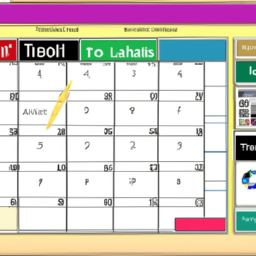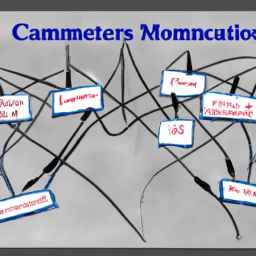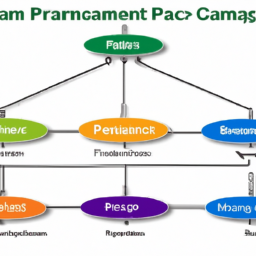Are you ready to take your project management skills to the next level?
In the fast-paced, high-pressure world of project management, success often hinges on more than just technical expertise. It requires a powerful and often underestimated tool: emotional intelligence.
Yes, you heard it right! Emotional intelligence, or EI, plays a pivotal role in project management, allowing you to navigate the complex web of relationships, conflicts, and decisions with finesse and confidence. It is the secret sauce that separates the good project managers from the exceptional ones.
By developing and harnessing your emotional intelligence, you can build strong relationships, communicate effectively, manage conflicts, make sound decisions, and create a positive and motivated team environment.
In this article, we will explore the fundamental role of emotional intelligence in project management and provide practical strategies to measure and develop these essential skills.
Get ready to unlock your full potential and become a true master of project management through the power of emotional intelligence!
Key Takeaways
- Emotional intelligence is a crucial tool for success in project management, as it helps navigate relationships, conflicts, and decisions effectively.
- Building trust among project team members is crucial for strong relationships, and it can be achieved through consistent and transparent communication, active listening, and respect for others’ perspectives.
- Effective collaboration in project management harnesses the skills and expertise of team members, leading to innovative solutions and increased productivity. It requires clear communication channels, open dialogue, and valuing the input of each team member.
- Managing conflict in project management requires effective communication, empathy, and understanding different perspectives. It can strengthen relationships and foster collaboration.
Understanding the Basics of Emotional Intelligence
You need to grasp the fundamental principles of emotional intelligence in order to effectively navigate the intricate dynamics of project management. Emotional intelligence in leadership is crucial for project managers as it involves the ability to understand and manage emotions, both in oneself and in others.
It is about being aware of your own emotions and how they impact your decision-making and interactions with team members. Additionally, emotional intelligence plays a significant role in workplace success. Project managers who possess high emotional intelligence are able to adapt to challenging situations, build strong relationships, and effectively communicate with team members.
By understanding the basics of emotional intelligence, you can cultivate these skills and create a positive and productive work environment. This will seamlessly transition into the subsequent section about building strong relationships and communication.
Building Strong Relationships and Communication
Establishing effective rapport and fostering open lines of communication are crucial in project settings, akin to laying a sturdy foundation for a successful endeavor.
Building trust is a key component in building strong relationships among project team members. When team members trust one another, they’re more likely to openly share ideas, collaborate effectively, and support each other throughout the project. Trust is built through consistent and transparent communication, active listening, and demonstrating respect for others’ perspectives.
Additionally, effective collaboration is essential for achieving project goals. By encouraging collaboration, project managers can harness the diverse skills and expertise of team members, leading to innovative solutions and increased productivity. Effective collaboration requires clear communication channels, encouraging open dialogue, and valuing the input of each team member.
This strong foundation of trust and collaboration sets the stage for managing conflict and difficult situations, where open communication and mutual respect are vital.
Managing Conflict and Difficult Situations
Managing conflict and difficult situations requires effective communication and a willingness to understand different perspectives, paving the way for resolution and growth.
When dealing with resistance, it’s crucial to approach the situation with empathy and open-mindedness. By acknowledging and validating the concerns of others, you can create an environment where conflicts can be addressed constructively.
Handling criticism is another important aspect of managing conflict. It’s essential to listen attentively, separate the message from the delivery, and remain calm and composed. By actively seeking feedback and using it as an opportunity for growth, you can turn criticism into a catalyst for improvement.
Effective conflict management not only resolves issues but also strengthens relationships and fosters collaboration.
Transitioning into enhancing decision-making and problem-solving skills, these abilities are vital for project managers to navigate complex situations and ensure successful outcomes.
Enhancing Decision-Making and Problem-Solving Skills
Developing strong decision-making and problem-solving skills is essential for successfully navigating complex situations and ensuring positive outcomes. To enhance critical thinking and improve team collaboration, consider the following:
-
Seek diverse perspectives: Encourage team members to share their ideas and opinions, fostering a collaborative environment that values different viewpoints.
-
Analyze data and gather information: Use data-driven insights to make informed decisions and solve problems effectively.
-
Consider potential risks and benefits: Evaluate the potential risks and benefits of different courses of action to make the best decision for the project.
-
Encourage creativity and innovation: Foster an environment that encourages creativity and innovation, allowing team members to come up with unique solutions to complex problems.
By enhancing critical thinking and improving team collaboration, you can foster a positive and motivated team environment, leading to even greater project success.
Fostering a Positive and Motivated Team Environment
Creating a positive and motivated team environment is crucial for maximizing productivity and achieving project success.
Team collaboration plays a vital role in fostering this type of environment. Encouraging open communication, active listening, and valuing the opinions of team members can enhance collaboration and create a sense of belonging.
Additionally, boosting team morale can significantly impact the overall performance of a project. Recognizing and celebrating achievements, providing constructive feedback, and offering support during challenging times can help create a positive atmosphere that motivates team members to give their best.
By creating a collaborative and supportive team environment, you can lay the foundation for success in your project.
In the subsequent section about measuring and developing emotional intelligence skills in project management, you will explore further strategies to enhance your team’s performance.
Measuring and Developing Emotional Intelligence Skills in Project Management
While it may seem challenging to measure and improve emotional intelligence skills in project management, it’s essential for creating a cohesive and successful team environment. To effectively assess emotional intelligence, consider using a validated emotional intelligence assessment tool. This can provide valuable insights into individuals’ strengths and areas for improvement.
Additionally, implementing emotional intelligence training programs can help project managers and team members develop their emotional intelligence skills. These programs can focus on enhancing self-awareness, empathy, effective communication, and conflict resolution.
By investing in emotional intelligence assessment and training, project teams can better understand and manage their emotions, build stronger relationships, and improve collaboration. Ultimately, this leads to improved project outcomes and a more positive and motivated team environment.
Frequently Asked Questions
What are the key elements of emotional intelligence that project managers should focus on?
To be an effective project manager, you should focus on key elements of emotional intelligence. Emotional intelligence, combined with leadership skills, can greatly enhance your ability to manage projects successfully.
Developing empathy skills is crucial, as it allows you to understand and connect with team members on a deeper level. This fosters better communication, collaboration, and ultimately, project success.
By prioritizing emotional intelligence and empathy, you can create a positive and productive work environment.
How can project managers effectively handle team conflicts while maintaining a positive team environment?
To effectively handle team conflicts while maintaining a positive team environment, project managers need to focus on conflict resolution and understanding team dynamics.
By actively listening to all parties involved, acknowledging and addressing the conflict, and finding a mutually agreeable solution, project managers can ensure that conflicts are resolved in a fair and respectful manner.
Additionally, fostering open communication and promoting a collaborative team culture can help prevent conflicts from escalating and maintain a positive team environment.
What strategies can project managers use to enhance their decision-making and problem-solving skills using emotional intelligence?
To enhance your decision-making and problem-solving skills using emotional intelligence, you can employ several effective strategies.
Firstly, practice self-awareness by recognizing and managing your own emotions. This will help you make more rational decisions.
Secondly, develop empathy towards team members, understanding their concerns and perspectives. This will aid in problem-solving by fostering collaboration and effective communication.
Lastly, cultivate emotional resilience, enabling you to handle difficult situations with composure and make sound decisions under pressure.
How can project managers measure their own emotional intelligence and continuously develop their skills in this area?
To measure your emotional intelligence and develop your skills in this area, start by taking an emotional intelligence assessment. This will give you a baseline understanding of your strengths and areas for improvement.
Next, focus on developing self-awareness by reflecting on your emotions and reactions in different situations. Practice empathy by actively listening and understanding others’ perspectives.
Lastly, seek feedback from colleagues and mentors to gain insight into how your emotional intelligence impacts your project management abilities.
What are some practical tips for project managers to build strong relationships and improve communication with team members using emotional intelligence techniques?
To build strong relationships and improve communication with team members using emotional intelligence techniques, focus on two key areas: building trust and managing stress.
Building trust involves being honest, transparent, and reliable. Show empathy and actively listen to understand your team members’ concerns and needs. Encourage open communication and create a supportive environment.
To manage stress, practice self-awareness and regulate your own emotions. Be mindful of your reactions and manage conflicts constructively. Additionally, promote a positive work-life balance for your team.
Remember, by implementing these techniques, you can foster strong relationships and improve communication within your team.
Conclusion
In conclusion, emotional intelligence is just a fancy term for being able to handle your feelings and deal with other people’s emotions. It’s not rocket science, folks! But apparently, it’s a crucial skill for project managers.
So, if you want to succeed in the wonderful world of project management, make sure to work on your emotional intelligence. Build relationships, communicate effectively, manage conflict, make smart decisions, and create a positive team environment. It’s all about being a touchy-feely leader, and who doesn’t love that?
Keep those emotions in check and watch your projects soar to success!



























